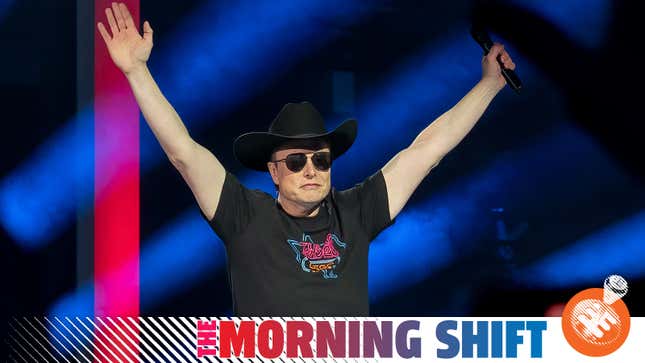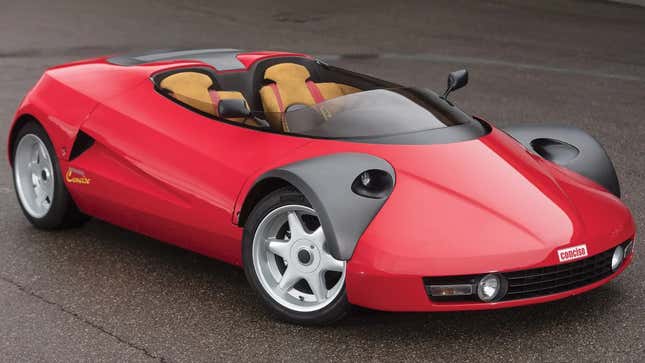
Elon Musk is again trying to inspire productivity with emails, General Motors can’t build its in-demand trucks any faster and Ferrari has gained a new executive to kick off a new era for Maranello. All that and more in The Morning Shift for Tuesday, June 14, 2022.
1st Gear: He Sent Another Email
Last time the Tesla CEO sent a company-wide email that leaked, he told employees they need to spend 40 hours in the office or pack their things and go work for one of those failing companies without in-person requirements. This time, his messaging was less threatening, more encouraging. From the Austin-American Statesman:
Musk sent Tesla employees an email over the weekend saying the company’s plant in Shanghai, China has been returning to full strength after slow production in recent weeks and encouraged employees to finish the quarter strong, according to the Bloomberg report.
“This has been a very tough quarter, primarily due to supply chain and production challenges in China,” the email said. “So we need to rally hard to recover!”
Tesla has been facing supply chain issues and had struggled to restart production at its factory in Shanghai due to COVID-related lockdowns. The facility is a major hub for the company in supplying cars to China and worldwide.
In the email, Musk also said that Tesla’s Austin-area facility is ramping up production, that the company’s Berlin facility built almost 1,000 cars and Fremont saw a record day of production, according to media reports.
These end-of-quarter, rally-the-troops emails are common from the CEO. Yet only a few weeks after the sudden work-from-home ban and then the leaked email sent to executives where Musk said Tesla needed to lop 10 percent of its headcount, the attempt to drum up morale can’t help but ring a little hollow. I can only imagine the dread Tesla employees must feel radiate through their very cores the moment they see Musk’s name pop up in their inboxes. Imagine the stress of getting an email from your company’s CEO, but the edicts are far more sweeping and impossible to predict. Also, nothing may come of them. Seems like a terrible way to live!
At any rate, Tesla’s stock price has plummeted by almost half over the last two months, through the Twitter thing he seems to be suddenly desperate to extricate himself from, and his memos don’t seem to be assuaging concerns from investors or his staff:
The memos come amid stock drops for Austin-based Tesla. The company’s shares have lost nearly a third of their value since early April, when shares were trading around $1,150, shortly after Musk first publicly floated the idea of buying social media platform Twitter. Tesla’s shares closed Monday at $647.21, down about 7% for the day.
Last week, Tesla said it is considering a stock split, according to the company’s annual proxy statement filed with the SEC.
There seems to be a correlation between things not going well for Tesla and Elon Musk talking, or sending emails. I say this purely out of concern for Tesla’s wellbeing, but maybe he should try not doing those things for a solid two weeks and see what happens, for the good of the company. Regardless, that seems unlikely to happen given that he’s agreed to speak at Twitter’s upcoming virtual town hall on Thursday.
2nd Gear: As Fast as They Can
If you happen to manufacture pickup trucks and particularly if you’re one of Detroit’s Big Three, life has been pretty hectic lately. You can’t build the things fast enough. Once upon a time you might’ve guessed the dramatic rise in the price of fuel would put a damper on such enthusiasm, but things are different now, as General Motors CEO Mary Barra reminded us during the company’s latest investor call. From Reuters:
General Motors Co Chief Executive Mary Barra said on Monday the automaker is “selling every truck we can build” and expanding North American truck-building capacity, even as U.S. gasoline prices hit record highs.
Barra made her comments during the automaker’s annual shareholder meeting.
GM is pursuing a two-track strategy: Investing heavily in electric vehicles for North America, China and other markets, and funding those investments by trying to maximize profits from its North American combustion pickup truck and large SUV lineups.
Barra said GM is planning higher-priced versions of its Silverado large pickup and its large SUV models.
That ongoing interest in trucks and full-size SUVs bodes well for GM’s pickup-to-EV pipeline of funds:
In response to shareholder questions, Barra said the “clear priority” for using cash generated by its operations is to “accelerate our EV plans.” She did not rule out share buybacks or other approaches to returning cash to shareholders.
Those two priorities might seem to be at odds, but GM is aligning them by concentrating on electric luxo-barges and 9,000-pound behemoths. So far, that strategy appears to be paying off.
3rd Gear: India’s Leading the All-Electric Fleet Dream
A quick read from Bloomberg published yesterday reminds us what we’ve known for some time — that EVs are well-suited for those last-mile deliveries and jobs, even though the aforementioned electric luxo-barges tend to dominate the conversation around electrification. One place where fleets are spurring EV adoption is India. From the article:
In India, fleet operators are already leading the way to electrification. BigBasket, which delivers everything from groceries to cooking utensils, is on a mission to electrify 90% of its fleet. In New Delhi, people often tweet about their rides with BluSmart, a 100% electric taxi startup with almost half a million app downloads. It estimates the market will grow more than four times to $90 billion by 2030 across several Indian mega cities. Amazon and Walmart-owned retailer Flipkart are also pushing for more EVs, but the problem is they can’t get enough supply.
“India has traditionally waited to localize wealthy countries’ auto products once prices fall,” Watson says. “But the ‘wait ten years’ approach doesn’t work with climate timelines today and so India in particular will have to develop indigenous technologies to make EVs cheap enough for near term mass adoption. That’s the opportunity we’re investing in.”
That’s different from larger, more developed nations where cars tend to grow bigger even as utilization remains limited. Call it a car obesity problem. In America, a typical vehicle sits in the garage 96% of the time, Sakkers wrote in his book Mobility Disruption Framework, citing research by McKinsey.
But in emerging economies like India, newer concepts are gaining ground. E-scooters are selling like hot cakes and the South Asian nation is now mulling battery swapping as opposed to charging stations to ensure faster adoption of cleaner fuels.
According to BloombergNEF, the market for light-duty trucks and vans in India is growing at two to three times that of Europe or the US, and almost 40% of the nation’s three-wheeler fleet is already electric.
“Car obesity” is a subject that has gained attention in 2022, and for good reason. It’s hard to imagine anything dismantling Americans’ lust for size and space, but at least some people are asking questions about it now.
4th Gear: Volkswagen Is Firing on All Cylinders Again
If we can still use that metaphor for the German automaker as it aggressively purges cylinders from its lineup. But anyway, VW’s Zwickau plant has been operating at diminished capacity between pauses in production since Russia invaded Ukraine. Now it’s back up and running, for real. From Automotive News:
Volkswagen Group resumed a three-shift operation at its EV factory in Zwickau, Germany, starting Monday, June 13.
Output at the plant, which builds full-electric cars for the VW, Audi and Cupra brands, is expected to increase to up to 1,300 vehicles a day, Automotive News sister publication Automobilwoche reported.
After Russia’s invasion of Ukraine, production was interrupted for three weeks in March due to disrupted supply chains, with production falling at times to 900 vehicles a day.
VW’s Saxony division, which operates the plant, said the supply of parts is now stable enough for the factory to return to three-shifts.
It’s unclear how long this will last, but VW should hope it does. Zwickau is a critical plant for the German conglomerate’s EV manufacturing. The “ID.3, ID.4, ID.5 compact EVs, the Audi Q4 E-tron, Audi Q4 Sportback E-tron and the Cupra Born” are all built in Zwickau.
5th Gear: Meet Ferrari’s New Brand Officer
Her name is Carla Liuni, and she has quite the diverse resume per Automotive News:
Ferrari has named Carla Liuni, an executive with experience in jewelry, luxury goods and at consumer goods corporation Proctor & Gamble, as chief brand officer.
Liuni, 55, starts her new post in September and will report to CEO Benedetto Vigna. She will be based in Milan.
Vigna said Liuni’s experience in building global luxury brands would be an asset for Ferrari, which is preparing for the transition to electrification and will soon release its first SUV, the Purosangue.
Since coming to Ferrari from STMicroelectonics in September 2021, Vigna has overseen multiple changes in the company’s management structure. He will unveil Ferrari’s strategy for the coming years at an event in Maranello, Italy, on Thursday.
This is a new era for Ferrari, what with the SUVs and electrics and all. The brand is hoping to broaden its clientele amid a crowded market for high-end EVs. Even though the Prancing Horse has always remained strong, it might just have to try at marketing for once, even just a little.
Reverse: It’s Not a Vacuum
UNIVAC, the first commercially produced digital computer made in the United States, was dedicated as such by the Census Bureau on this day in 1951, 71 years ago. It’s called that because of the vacuum tubes in its design, not because it sucked things up.
Neutral: This Is a Ferrari

As long as we’re talking about Ferrari, here’s the Conciso, a one-off designed by Bernd Michalak built atop a 328 GTS. It may not wear the badge on its grille now, but it did at one time. If you ask me, that technically makes it a Ferrari. It sold for 109,000 euros back in 2018 via RM Sotheby’s, and I reckon that’s a mighty good return for a car that only ever makes me giggle when I see it in pictures.